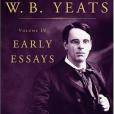《The Collected Works of W.B. Yeats Volume IV》是Scribner出版的圖書,作者是William Butler Yeats,Richard J. Finneran,George Bornstein。
基本介紹
- 作者:William Butler Yeats、Richard J. Finneran、George Bornstein
- 出版時間:2007年3月6日
- 出版社:Scribner
- 頁數:560 頁
- ISBN:9780684807294
- 裝幀:Hardcover
- 叢書:The Collected Works of W. B. Yeats
- 定價 :USD 50.00元
內容簡介
The Collected Works of W. B. Yeats, Volume IV: Early Essays is part of a fourteen-volume series under the general editorship of eminent Yeats scholars George Bornstein and George Mills Harper. These volumes include virtually all of the Nobel laureate's published work, in authoritative texts with extensive explanatory notes. Early Essays, edited by the internationally esteeme...(展開全部) The Collected Works of W. B. Yeats, Volume IV: Early Essays is part of a fourteen-volume series under the general editorship of eminent Yeats scholars George Bornstein and George Mills Harper. These volumes include virtually all of the Nobel laureate's published work, in authoritative texts with extensive explanatory notes. Early Essays, edited by the internationally esteemed Yeats scholars George Bornstein and the late Richard J. Finneran, includes the contents of the two most important collections of Yeats's critical prose, Ideas of Good and Evil (1903) and The Cutting of an Agate (1912, 1919). Among the seminal essays are considerations of Blake, Shakespeare, Shelley, Spenser, and Synge, as well as an extended discussion of the Japanese Noh theatre. The first scholarly edition of these materials, Early Essays offers a corrected text and detailed annotation of all allusions. Several appendices gather materials from early printings which were later excluded, as well as illuminating black-and-white illustrations. Early Essays is an essential sourcebook for understanding Yeats's career as both writer and literary critic, and for the development of modern poetry and criticism. Here, Yeats works out many of his key ideas on poetry, politics, and the theater. He gives interpretations of writers critical to his development and presents a compelling vision of Ireland and the modern world during the last decade of the nineteenth century and first two decades of the twentieth. As T. S. Eliot remarked, Yeats was one of those few whose history is the history of the

